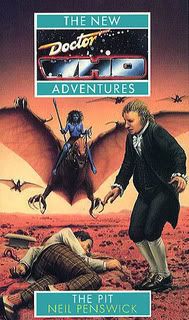
The Pit by Neil Penswick
In Brief: It's in some ways rather good. In some ways it's very bad. It's written in an odd style. With constant use of short sentences. And sentence fragments. And few commas.
Which gets a bit annoying.
Quickly.
The Pit has left me scratching my head a bit. "Known" by fandom as the *Officially Worst-Ever Doctor Who Book Ever Ever Ever* (based on a Doctor Who Magazine poll done back in the late-90s which put The Pit somewhere below a skin-rash in popularity) I was surprised to find that other than a few boring bits, and the aforementioned odd prose style, I sort of liked it. Well, maybe more that I appreciated the author's ambition. Although his execution not so much.
The story itself, or rather the "what happens" bits, is actually rather good. If grim. Benny asks the Doctor to take her to a Solar System which "disappeared" 50 years before her time so they could find out what happened. The location itself, and the events surrounding it's (spoiler) eventual destruction are well thought out and interesting (despite some unnecessary Doctor Who Continuity being involved). While there are no real stand-out characters other than the temporally-shifted poet William Blake(!!!) who accompanies the Doctor through much of the novel thankfully there's no-one as bland as found in likes of Time's Crucible or Witch Mark.
But I can't quite say that the book actually "works". Much of it feels like a bit of a slog.
A slog through short sentences.
There are a few factors that create a vague sense of tedium and I suspect they're the reason why the book has gotten a bit of a bad reputation through the years (amongst the few of us who have read the books that is). The first factor is the already mentioned writing style which is at best refreshingly non-standard and at worse downright irritating. The main thing that bugged me was how at times rather than get the text of a conversation we'd instead get a description of what was said. It means part of the book feels more like a precis than literature and makes the reader feel distanced from what is happening. Now while I imagine this was probably on purpose I have to question why the author would willingly write in such as way. Perhaps a firt-time novelist who thought it was clever?
Unfortunately when there *was* dialogue it was fairly awful. Characters didn't seem to be having conversations but rather spouting exposition and/or philosophy at each other. It felt less like people interacting and more like the author taking the opportunity to show off his religious/psychology knowledge.
The other thing I noticed is how the Doctor and Bernice are really peripheral to the events in the book. Actually, now that I think about it if they hadn't actually landed nothing at the end of the book would really have been any different. (Stuff would have still blowed-up-real-good). I suspect this probably annoyed some people who felt that this made the Doctor "ineffective" while ignoring that was probably the point. For once he's been caught up in a greater-power's machinations and is out of his depth. All he can do at the end is accept that fact and move on. I think a lot of people can't move outside of the context of The Doctor as hero and the attempt here to turn the character into something darker didn't go down well.
But despite the fact there are some really good ideas in The Pit the poor prose, meandering story, padding (exactly what was the point of the trip to Victorian London and Stonehenge?!!) and oppressively serious and dour tone keep me from recommending the book. Although I do appreciate that at least the publishers put out another book with its own distinct style and ambition (albeit one not realised).
I mean, if I wanted the same experience all of the time I'd watch Star Trek.
No comments:
Post a Comment